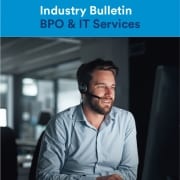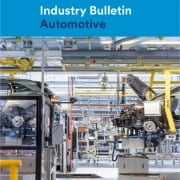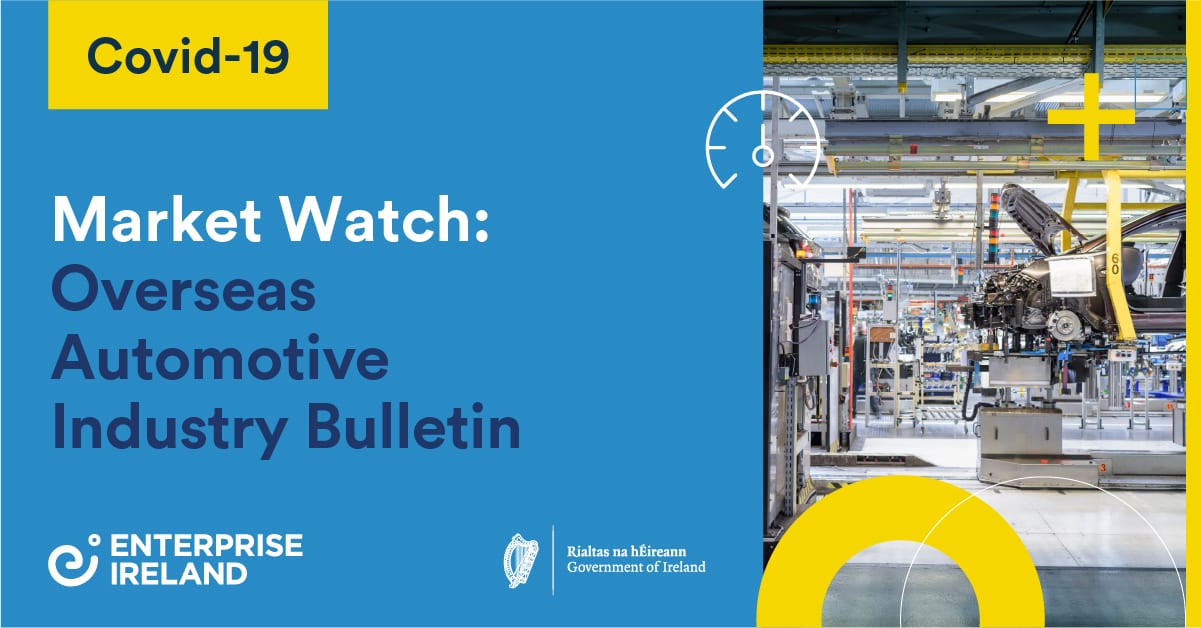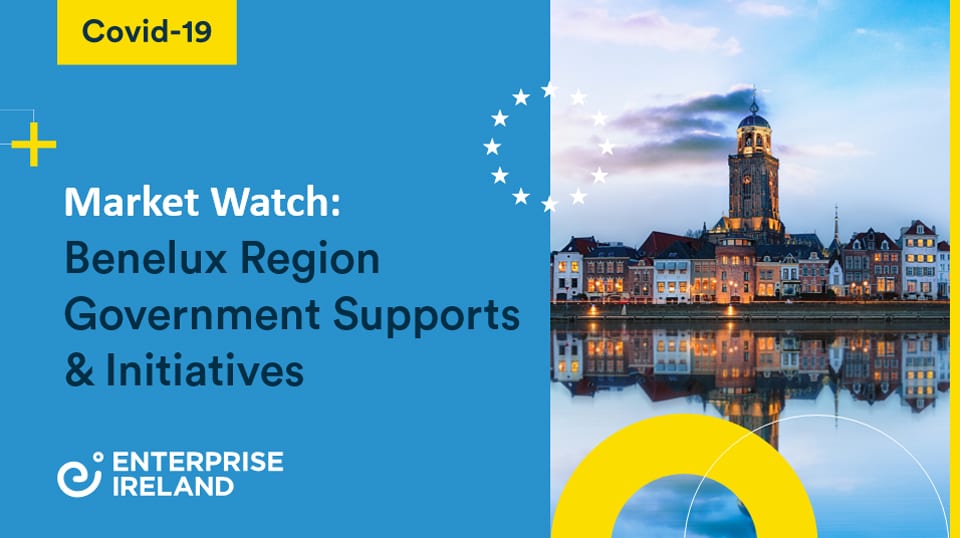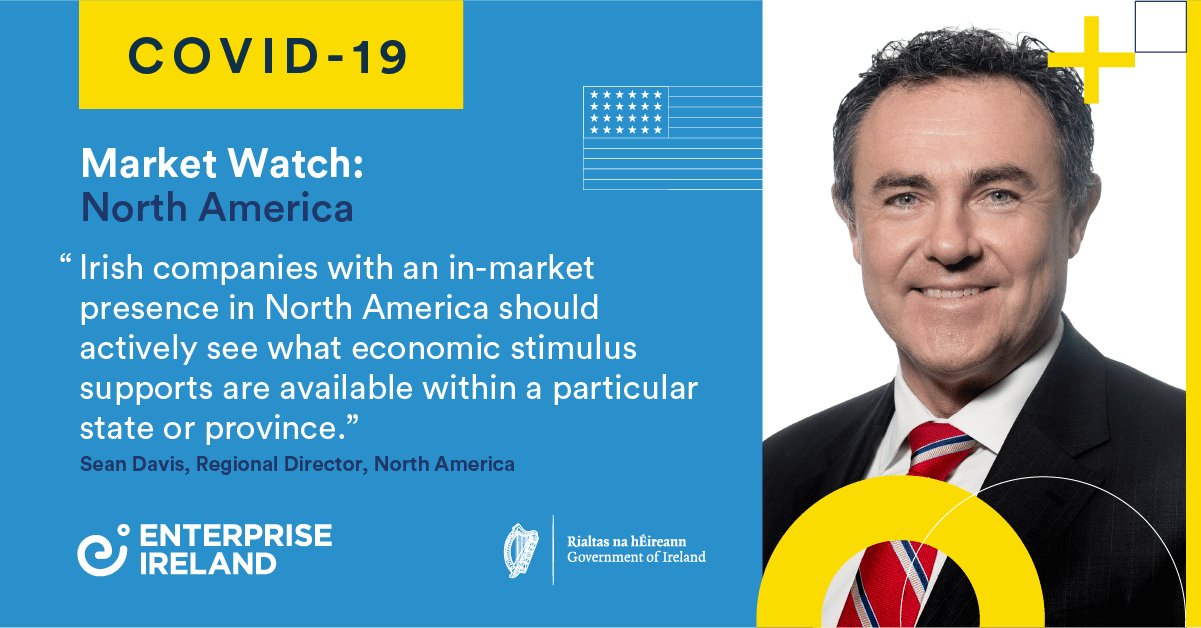Market Watch Germany – Webinar – Impact on Supply Chain
Enterprise Ireland’s offices in Germany have launched a series of Webinars: Market Watch Germany. Every Wednesday at 14:00 BST/15:00 CET a new theme will be addressed to help Irish companies exporting to Germany navigate the challenges and opportunities presented by Covid 19.
For the second webinar in the series on Wednesday 15th April, we were joined by Dr. Patrick Kim from BridgeBuilder.de and Dr. Gökhan Yüzgülec from Inverto GmbH.
This Webinar explores how to cut through the noise to stay reliably informed during the crisis, the impact on supply chains and procurement, and how to prepare for the shifts after Covid-19.
Market Watch Industry Bulletin – Fintech & Financial Services
Download the bulletin here.
Enterprise Ireland financial services & fintech companies are facing unprecedented challenges to continue to build and scale their businesses globally at the rate they were before the crisis. Though they are demonstrating an impressive flexibility and innovation capability to adapt to the new situation and to fulfil their clients’ emerging challenges.
Enterprise Ireland‘s Market Watch for the financial services industry provides insights on the potential impact of Covid-19 on your business. Read the bulletin here.
Market Watch Industry Bulletin – BPO & IT
Download the bulletin here.
In a time of uncertainty and disruption across every industry, companies are reliant on their customer experience and IT teams to ensure they remain connected to their client base, particularly those in front line industries
Irish Outsourcing and IT companies are providing critical services to ensure international companies can overcome these engagement challenges from a remote setting. In our BPO & IT Services Industry Bulletin, Enterprise Ireland’s market advisors reflect on the impact of Covid-19, and outline significant international developments, opportunities, financial supports, and challenges facing Irish companies in the sector.
Read the full report here.
Market Watch Industry Bulletin – Automotive
Download the bulletin here.
The global automotive industry faces an as of yet unseen level of disruption to its production capabilities. Companies along the supply chain are challenged by a drop in demand for vehicles and related products, fragmentation of international supply chains and production plant closures of most OEMs and Tiers. Markets are transforming at an unprecedented pace, with experts rushing to forecast the outcomes and offer solutions to the rapidly changing industry where necessary.
Enterprise Ireland’s first Automotive Industry Bulletin contains a summary of major developments, opportunities and challenges as well as relevant funding supports for each region. The assessment is based on the insights from Enterprise Ireland Global Market Advisors for the automotive industry.
Read the full report here.
Market Watch – Benelux
The Market Watch bulletin for the Benelux region (Belgium, The Netherlands and Luxembourg) provides insights from Enterprise Ireland ’s market advisors across the region that may be helpful for your business, in the context of Covid-19.
Reporting from each Benelux market, in this edition we share information on travel to the markets and market specific government supports & initiatives.
Download the bulletin here.
Innovation and creativity in a time of crisis
The Covid-19 crisis has brought out the best in Irish companies, which are facing the crisis with a range of innovative solutions.
Repurposing production lines to manufacture personal protective equipment (PPE)and hand sanitiser, new digital healthcare apps, and the rapid development of new test kit componentsare just a few of the many highly innovative responses to the Covid-19 crisis that have emerged from Irish companies in recent months.
“It’s amazing how resourceful and creative people become when they are challenged,” says Enterprise Ireland, Divisional Manager for Innovation & Competitiveness, Tom Kelly. “We are seeing companies innovating, adapting and creating new solutions and product lines in response to the crisis.”
Pivoting business to address a need
He points to the shortage of hand sanitiser products as an example. “The need for a massive increase in supplies was one of the earliest instances. Several companies repurposed their existing systems to manufacture them. Mervue in Cork partnered with Irish Distillers and is selling directly into the HSE. EPC in Clara, Co Offaly manufactures medicated toothpaste, but has set up a completely new line for sanitisers; it went to Grants in Tullamore to secure a supply of alcohol. EPC is also selling into the HSE and other markets. That story has been repeated by other companies like Univet, Chanelle and Ovelle.”
The shortage of PPE is also being addressed. “Irema Ireland ramped up production to increase supplies of high-quality surgical and respiratory masks,” says Kelly. “Other companies are looking at aprons and gowns, but that’s still at an early stage.”
“From a standing start, we have seen a number of companies like Key Plastics step up to manufacture face shields for use in the health service. The engineering sector has been particularly responsive” says Kelly.
Moving into the lab, Aalto Bio Reagents is manufacturing a nucleocapsid protein for diagnostic tests. This is known as a lysis buffer, which is used for the purpose of breaking open cells. “Aalto Bio Reagents worked very closely with the HSE and the National Virus Reference Laboratory and came up with a formulation within a week. Serosep is another company that is manufacturing test kits. You have to recognise the courage and capability of companies like that. What they are doing is the result of an innovative mindset, which is serving the country very well at present.”
It is not only established companies that are making a contribution. Enterprise Ireland-supported high potential start-up (HPSUs) are also playing their part. “CALT Dynamics in Wicklow, a 3D printing start-up in Ireland, are printing 3D printable protective visors that could help to bridge the shortfall of PPE both in Ireland and overseas,” says Enterprise Ireland, HPSU Manager, Industrial & Lifesciences Alan Hobbs. “It has linked up with Automatic Plastics in Tinahely and is now supplying products to a number of hospitals.”
Digital Health
These early-stage companies are making a particular mark in the digital health realm. “We’ve been seeing a distinct uptick in that area,” says Hobbs. “A number of Irish companies have secured contracts with the HSE, and with other health services. We now have a cohort of innovative young Irish start-ups that have just secured their first reference sites in the domestic market. This is very important, because when they go abroad, they will get asked about sales at home.”
One such company is practice management software developer Wellola. It has launched a secure patient communication portal for the HSE that enables GPs to treat people remotely if possible.
Meanwhile, all appointments at Covid-19 urgent test centres are scheduled using software from another innovative Irish firm, Swiftqueue. “Patients don’t realise that this is being done on Irish-developed software,” says Hobbs.
These are just a few among many new healthcare solutions being brought to market by Irish firms, according to Hobbs. “PMD Solutions is trialling new respiratory monitoring technology with Beaumont Hospital at the moment. This fits in with the HSE strategy of shifting care into the community, and it takes a lot of the stress off hospitals. Jinga Life’s technology for the e-transfer of CT scans means less handling of CDs and so on, and it also reduces risk of infection. Finally, patientMpower provides the tools for patients with lung complaints to be followed remotely with integrated medication management. The company is also providing a new remote triage service for Covid-19 patients in the home.
“There is also an impact on supply chains. Having companies doing these things locally makes a huge difference to delivery times.” says Hobbs.
Looking to the future, Kelly says the Covid-19 crisis is likely to change the way we think about healthcare supply chains. “We already recognise the need for food security and energy security. It is becoming increasingly obvious that healthcare security has to be viewed in the same way.”
To learn more about the steps companies can take to address the impact of Covid-19 visit our business supports page.
Market Watch Industry Bulletin – Cleantech
Download the bulletin here.
The global cleantech and energy industry is experiencing significant disruption and operational issues due to Covid-19. In addition, changing patterns of energy demand, declining oil prices, the continued growth of renewable energy generation and stringent climate action plans, means global markets are changing at pace.
In this bulletin, Enterprise Ireland’s market advisors assess the implications of Covid-19 on the sector and summarise the major developments, opportunities and challenges across international markets.
Read the full report here.
Market Watch Industry Bulletin – Transport
Download the bulletin here.
As an island economy, our economic prosperity is heavily dependent on the reliability of the global transport networks to consistently source key materials from suppliers and in turn ship the finished goods to customers.
The Transport Bulletin provides insights from Enterprise Ireland’s market advisors and industry experts across the world, bringing you a practical overview of freight transport conditions from different markets.
Market Watch Industry Bulletin – Agritech & Machinery
Download the bulletin here.
The Irish agricultural machinery and agritech sector has been designated as a critical service, committed to supplying customers and fulfilling current and future orders. While the sector is open, the Covid-19 crisis presents significant challenges.
Enterprise Ireland‘s Agritech and Machinery industry bulletin looks at international developments from labour shortages to supply chain issues to border closures, and industry stimulus packages which may impact your business.
Read the full report here.
Market Watch – A view from North America
North America, like the rest of the world, has been seriously impacted by the outbreak of COVID-19 and Sean Davis, Enterprise Ireland Regional Director of North America, says while there is no certainty in business at the moment, Irish exporters should seek to reassure their US customers.
Key Takeaways
- The situation is changing daily but most states are operating on a work-from-home basis.
- Travel and supply chain disrupted in many areas.
- Irish exporters are advised to keep in contact with their North American clients, be aware of their situation and the need to communicate more personally via telephone or video link.
- Business is still moving so Irish exporters are encouraged to adapt where possible and utilise time wisely in order to be ready for any business which should arise.
“It’s an evolving situation across North America but for the most part there are work-from -home requirements in most jurisdictions across both the US and Canada,” he says. “Travel is heavily restricted, and there is some supply chain disruption, also your customers are busily working to stabilize their own businesses. There is also uncertainty and fear of the unknown, along with customer cash flow disruption and in some cases contract negotiations frozen.
“With this in mind the focus of activity for Irish exporters should be around three pillars – stabilise, reset and recover, which in the immediate term, means stabilise. So staying close to customers and key strategic partners is vital, as is being aware of their situation, i.e. in addition to shared commercial challenges being able to connect by having an understanding of the specific impact of this crisis in their town or city is an important demonstration of empathy at a critical time
“We are seeing instances where contacts in some NA companies we are close to have been directly and profoundly affected personally by Covid-19, so again situational awareness is important and as much as possible communication needs to be via telephone or video conference as it is much more personal, empathetic and engaging.
“But brevity is key when it comes to the US and while many people are working from home, they are still time poor, so it’s important to keep things brief – to quote Franklin D. Roosevelt ‘Be sincere, be brief, be seated’.”
Davis says that the Reset and Recover phases will be more successful if companies use the stabilise period to accumulate as much market and customer intelligence as possible.
“This is an important time to identify where your company and product offering might have to pivot in order to be ready,” he advises.
“North America is an enormous economy, over $25TRN, and the US is the second largest single export market for Irish companies so despite the challenging times there will be huge market opportunity to develop as we recover and re-emerge. So any movement which demonstrates a willingness, where possible, to share some of the burden created by cash flow or credit terms is beneficial.” says Davis.
“But don’t over-extend your company’s credit terms either; this is a rapidly evolving situation and cash flow is crucial. Any Irish companies with an in-market presence and employing in the region, especially those with significant deployment, should be actively looking at what supports are being made available whether through economic stimulus packages or through funds available to support key sector strategic priorities within a country, state or province.”
Enterprise Ireland has seven offices across the region with teams ready to support their client companies throughout this journey.
“We have developed and completed a six-part webinar series called “Reliance and Adaptability in Extraordinary Times” led by a series of key opinion leaders in areas such as Leadership and Communication, Crisis Communication and Creating a New Narrative,” says Davis. “Our teams are working on a one-to-one basis with clients through key areas and deliverables. And for significantly impacted sectors, we have delivered, and are working on, other webinars bringing client companies and subject matter experts together.
“On a weekly basis, we are gathering market and sector intelligence which is being collated centrally in HQ and distributed via our colleagues in Ireland to client companies.”
While not all sectors are impacted equally, Davis says there are still opportunities available and companies are still signing new business by solving problems, delivering innovation and fostering good partnerships
“Not everything has ground to a halt,” he says. “So I would advise companies to pivot effectively, use our market research centre as it’s a prime time for under-utilised members of staff to build valuable market intelligence or look at opportunities in other North American geographies you have not previously considered.”
“North America is a vast economic and geographical landscape which is likely to emerge from the current crisis in different stages and in different states (US) or provinces (Canada), hence some markets are likely to enter that Recover phase sooner than others and our network will be able to advise and support as this happens.”
Sean Davis is Enterprise Ireland’s Regional Director of North America. To learn more about the steps companies can take to address the impact of Covid-19 visit our business supports page.
Communications moves up to the Covid-19 front
Poppulo helps ensure first casualty of war on virus isn’t truth
Irish technology company Poppulo is supporting critical communications for frontline workers in the battle against Covid-19.
The company, which is a global leader in employee communications technology, has opened up its secure, effective communications platform to healthcare crisis teams battling the pandemic – for free.
It is already assisting public health services such as Ireland’s Health Services Executive (HSE), having fast-tracked the set-up process so that its Covid crisis team can get up and running on the platform as quickly as possible.
Effective employee communications are Poppulo’s stock in trade. It manages secure communications between over 25 million employees, in over 900 companies, across more than 100 countries, every day.
Its clients are some of the world’s most successful organisations. These include pharmaceutical company GSK (GlaxoSmithKline), car maker Rolls Royce, fast moving consumer goods company Unilever, telecoms giant Telefónica and building systems specialist Johnson Controls.
The Cork, Ireland based company has its US headquarters in Boston, MA. It specialises in enabling organisations with more than 1000 employees to solve the kind of complex employee communication and engagement challenges that can arise in large, international workforces.
Its custom-built software is designed for internal communications only, enabling managers to plan, target, publish and measure the impact of their communications across multiple digital channels.
These include email, mobile, video and social networks, all of which are handled securely via the Poppulo platform. It also provides organisations with extensive analytics, enabling them to measure and assess employee sentiment.
Staff under pressure
In recent weeks, communications relating to the COVID-19 crisis have soared on the platform.
“The key thing for organisations is to understand how important good communications is to all employees,” says Poppulo founder and CEO Andrew O’Shaughnessy
Frontline workers are shouldering the heaviest burden right now but all employees are facing challenges in a changed world, especially remote workers.
“Everyone is under a lot of pressure. This is something that was forced on all of us really quickly and all of a sudden many employees found themselves at home,” he says.
Equally suddenly, organisations must find ways to replace all the invaluable interactions that usually take place in the workplace.
“With remote workers, you can’t just pick up the phone and ring people because they are in virtual meetings, and their calendars are crowded,” says O’Shaughnessy.
Single source of truth
Yet good internal communications are more essential than ever. “Employees are under pressure not just from their job but from feelings of isolation, overwhelm, and mental health issues. At a time like this, your employee base needs huge support,” he says.
Clear, secure and engaging communication is one of the most effective ways you have to support staff them.
“Right now there is a lot of disinformation about, and things are changing very quickly, on a daily basis. It is therefore really important for every company to establish itself as a single source of truth for employees,” says O’Shaughnessy
In “just a couple of weeks” organisations, both private and public, have undergone the kind of transformation project that would previously have been given 18 months to plan and execute, he points out.
Such a radical transformation can only succeed on the basis of having an effective communications strategy, both in terms of content and delivery.
That means avoiding the kind of disinformation that may come via public social media platforms, such as WhatsApp. These “can’t be locked down, are crowded with noise, don’t allow you to target individual people, and offer no visibility of who is reading them,” he says.
Tracking talk
Poppulo allows organisations to rapidly send urgent communications to whoever needs to get them, track what’s been read or not opened in real-time, and take corrective action through resends, updates and instructions.
Poppulo’s Blackout functionality kills the circulation of non-essential information by ensuring employees only get relevant and useful information, during specific times, increasing clarity while minimising over-communication. Its targeting capability lets users engage the people, sections, and geographies who need the information, without needlessly involving those who don’t.
Its survey functionality allows users understand how their communications are resonating, both in business units and across the organisation, with reports that can inform further actions. The platform also provides content templates which allow users to save valuable time, for greater speed, efficiency and sign off.
Trusted source
Crucially, it alleviates employee uncertainty in a time of crisis through personalised communications from trusted sources.
Poppulo’s secure communications platform works across a range of channels including email, mobile and video and right now video is proving hugely important as a way of helping remote workers cope with isolation, he says.
In any change management scenario organisations appreciate that good communications are the key to success. In a pandemic, they can be no less than the difference between life and death. It’s why communications has moved not just centre stage but up to the front.
“People are calling communications a critical business system. That has never happened before,” he says.






